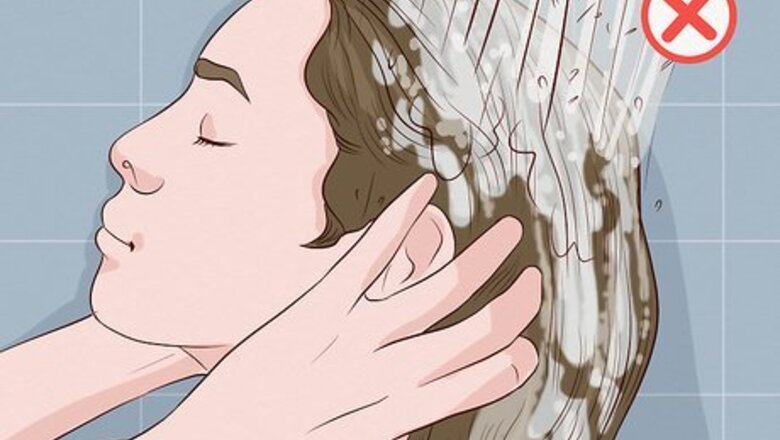
views
Shampoo every other day.
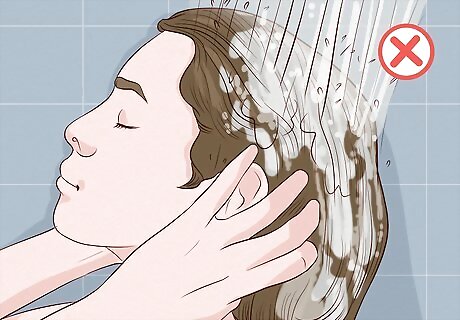
Avoid overwashing your hair and drying out your scalp. Shampooing strips your hair and scalp of your natural oils, so don’t do it every day. Always use conditioner whenever you shampoo to hydrate your scalp and keep your hair healthy and shiny, which will encourage new growth. Washing your hair with cold water to keep it from drying out is actually a myth. Warm water is totally fine (and feels nicer).
Get a trim every 3 months.
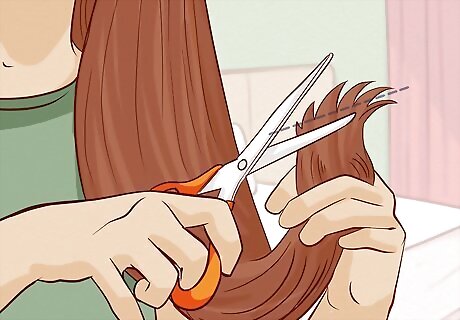
Cut off split ends to prevent breakage. While it’s a myth that cutting your hair makes it grow faster, getting a light trim every couple of months can help prevent breakage, so you'll be able to grow your hair longer. You don’t have to have any length taken off, just skim the edges.
Do a weekly scalp mask.
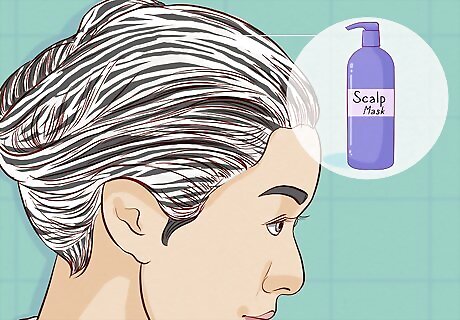
It’ll exfoliate and moisturize your scalp. A scalp mask is a deep conditioning cream that you apply directly to your scalp to help soothe and rejuvenate it. It also boosts your hair and scalp health, which can encourage hair growth. Apply a scalp mask once a week for the best results. You can find scalp masks at your local beauty supply store or department store. You can also order them online. Applying a deep conditioner to your hair once a week can repair, replenish, and rehydrate damaged hair from the root all the way down to the ends of your tresses.
Avoid using a hairdryer or straightener.
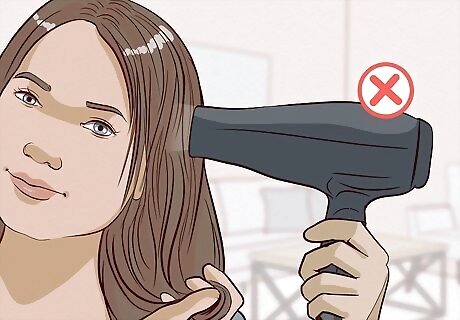
They can cause or increase your hair loss. Hairdryers and hair straighteners can actually cause major damage to your hair and can dry out your scalp. If you’re trying to encourage hair growth, steer clear of anything that could contribute to potential hair loss. Additionally, chemical straighteners or perms can also dry out your hair and make it brittle. It’s best to avoid them as well if you’re trying to encourage your hair to grow.
Use minoxidil (Rogaine).
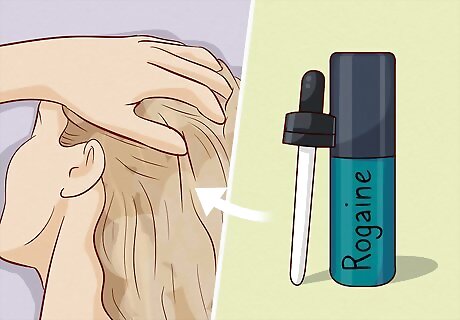
Apply it directly to your scalp to stimulate hair growth. If you’re experiencing significant hair loss, minoxidil, also known as Rogaine, has been shown to help regrow hair. Pick some up from your local pharmacy and apply it to your scalp according to the directions on the packaging. It’ll take up to 2 months before you notice major results, but if you stick to a regular routine, you can use minoxidil to encourage hair growth. You can purchase Rogaine and generic versions over the counter, but your doctor may prescribe you a stronger version for severe hair loss. If you’re a woman, make sure you use minoxidil products designed for women. If you’re pregnant or breastfeeding, don’t use it at all to avoid potentially harming your baby.
Apply peppermint oil for a natural alternative.
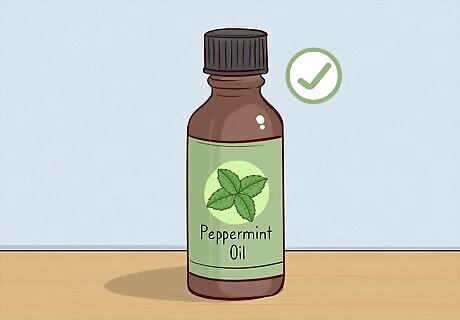
Rub it into your scalp to help boost hair growth. Studies suggest that peppermint oil can help promote hair growth without any negative side effects. Apply the oil once a day for at least 4 weeks for noticeable results. You’ll also smell really nice! You can find peppermint oil at your local pharmacy or anywhere that sells essential oils. You can also order it online. Go with 100% pure peppermint oil so there aren’t any additives or chemicals.
Take zinc and vitamin B12.
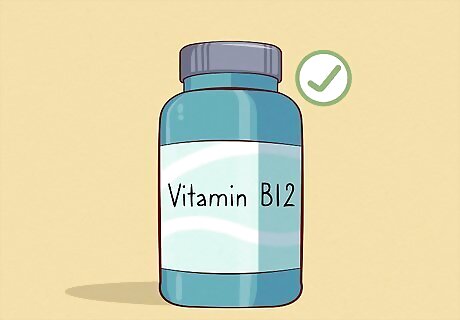
They both help repair and grow your hair. Zinc and vitamin B12 are naturally found in your diet, but if you aren’t getting enough of them, you could have trouble growing more hair as well. Additionally, vitamin B12 is only found in animal products, so if you’re a vegan or vegetarian, you may not be getting enough. Give your hair growth a boost by taking a daily zinc and vitamin B12 supplement. If you’re a vegan, don’t worry. There are plant-based vitamin B12 supplements you can take to make sure you’re getting enough of it without consuming any animal products. There aren’t any risks associated with taking zinc and vitamin B12 supplements. If you have too much in your system, your body will flush it out naturally.
Try biotin supplements.
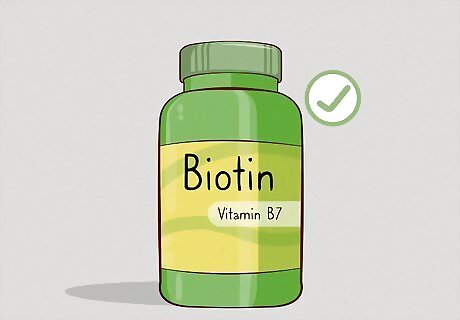
Make sure you have enough of it in your system. Biotin has been touted as a magical treatment for hair loss, but it doesn’t actually cause your hair to grow. Biotin is a vitamin that helps your body break down fats, carbohydrates, and proteins, and if you don’t have enough of it, it can lead to hair loss. So if you’re trying to encourage healthy hair growth, you can take a biotin supplement to make sure you aren’t deficient. Biotin is also known as vitamin B7. You can find biotin supplements at your local vitamin shop or pharmacy. Because biotin is a water-soluble vitamin, any excess in your system will be excreted in your urine, so there’s very little chance of an overdose.
Take vitamin D supplements.
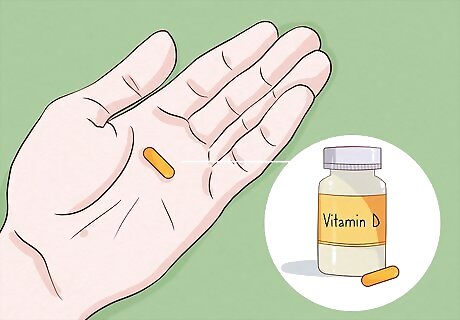
It’s an important part of your hair’s growth cycle. Your body naturally creates vitamin D from sunlight on your skin, but it’s really common for folks to have a deficiency. Every one of your hair follicles has a vitamin D receptor hormone, and it plays an important role in growing hair. A daily vitamin D supplement will make sure you’ve got enough to continue growing more hair. While vitamin D toxicity from taking too much is very rare, if you experience any side effects such as nausea or frequent urination, stop taking vitamin D supplements.
Ask your doctor about iron supplements.
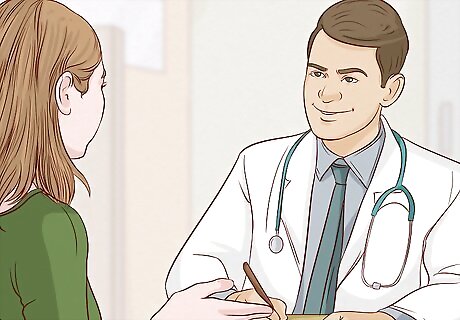
Make sure they’re safe for you to take before you try them. An iron deficiency can cause you to lose your hair. But having too much iron in your system can be really harmful. If you think you may have an iron deficiency, talk to your doctor. They’ll be able to examine you and run tests to determine if it’s safe for you to take an iron supplement.
Eat a healthy diet.
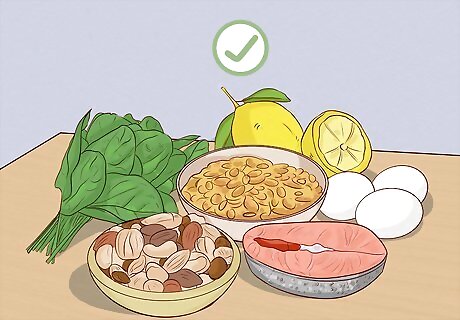
Poor nutrition can contribute to hair loss. One of the best ways you can keep your hair (and scalp) happy and healthy is to give it the nutrients it needs to thrive. Start following a healthy diet to ensure that you’re getting quality nutrition and enough of the important building blocks of hair growth, such as essential acids. Focus on eating lots of veggies, lean proteins, and whole grains and try to limit processed and junk food. You can also try a protein supplement to make sure you’re getting enough amino acids.
Reduce your stress levels.
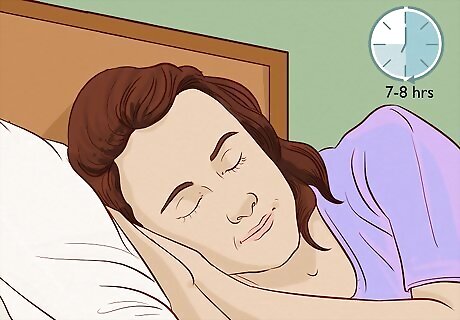
Stress can lead to additional hair loss. Find ways that help you reduce the amount of stress in your life such as exercise, massage, meditation, or breathing techniques. Reducing your stress can help prevent more hair loss and boost your skin and scalp health, which can help encourage new hair to grow. Sleep can play a big role in your stress as well. Try to get at least 7-8 hours of restful sleep each night. If you’re really struggling to deal with any stress or anxiety in your life, try talking to a mental health professional such as a therapist, counselor, or psychiatrist.
Consider hair transplantation.
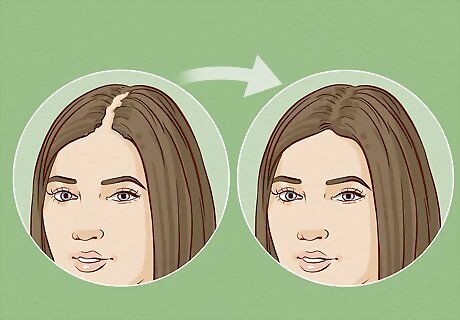
It’s a procedure that can help you regrow your hair. A hair transplant involves removing a strip of your scalp where your hair is growing well (such as the back of your head) and implanting it in an area where your hair is thinning. Once you recover from the procedure, the implanted follicles will start grow hair and fill in the area. Talk to your doctor to find out if hair transplantation is an option for you. Keep in mind that the full hair transplantation process can cost around $10,000.

















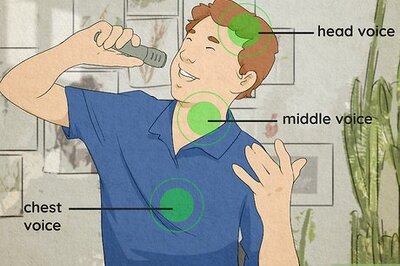


Comments
0 comment